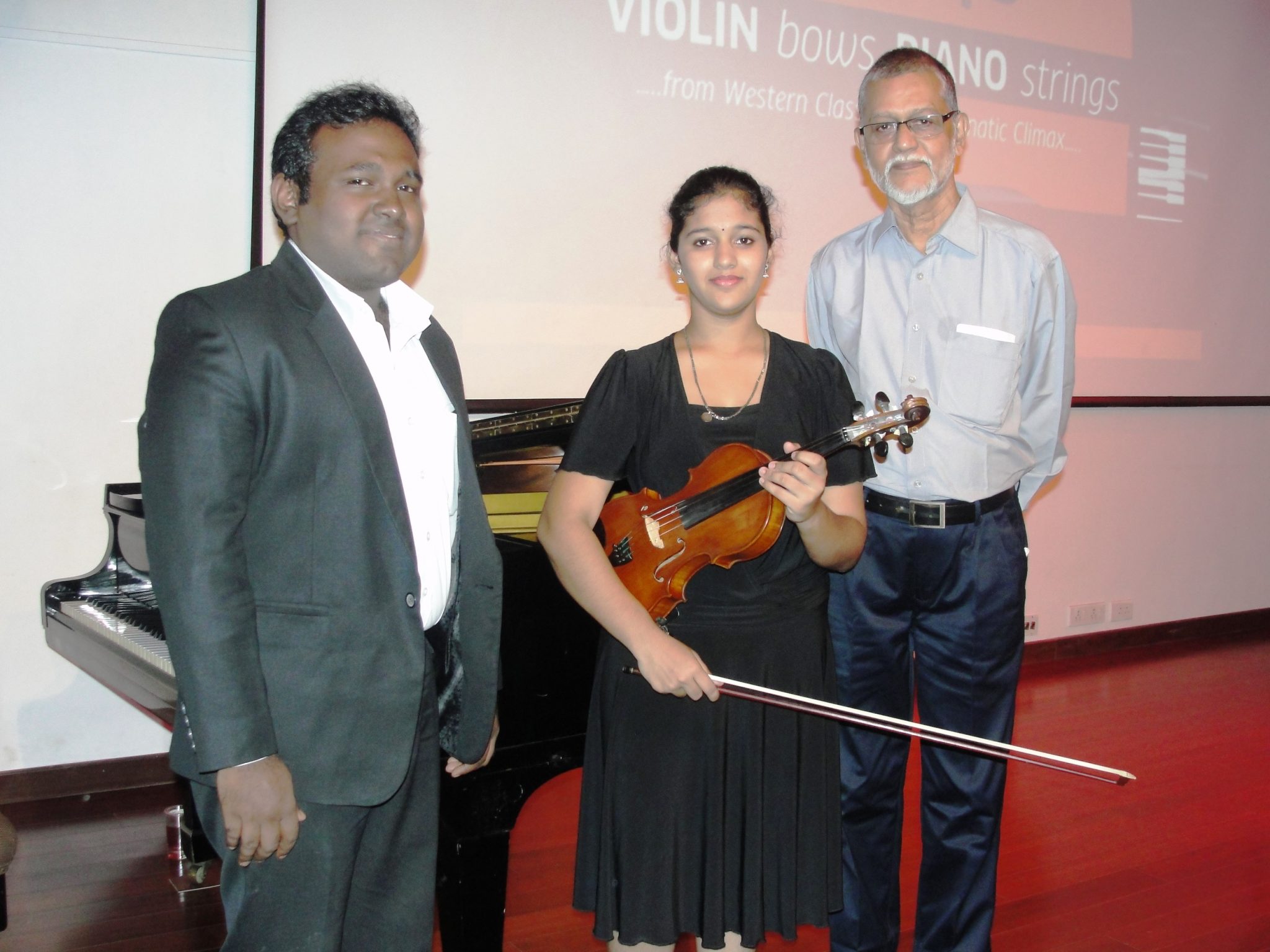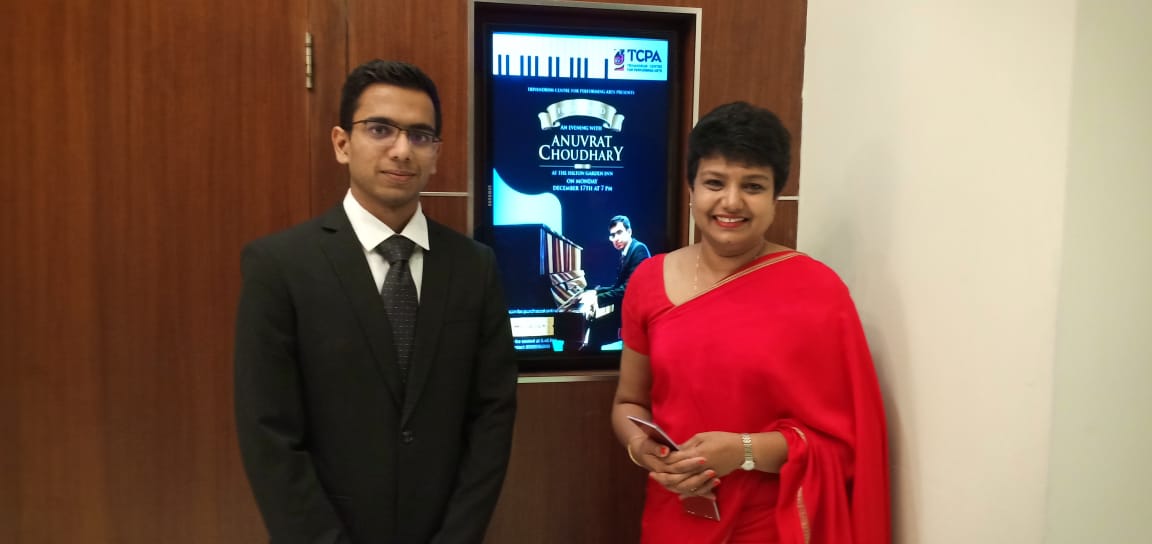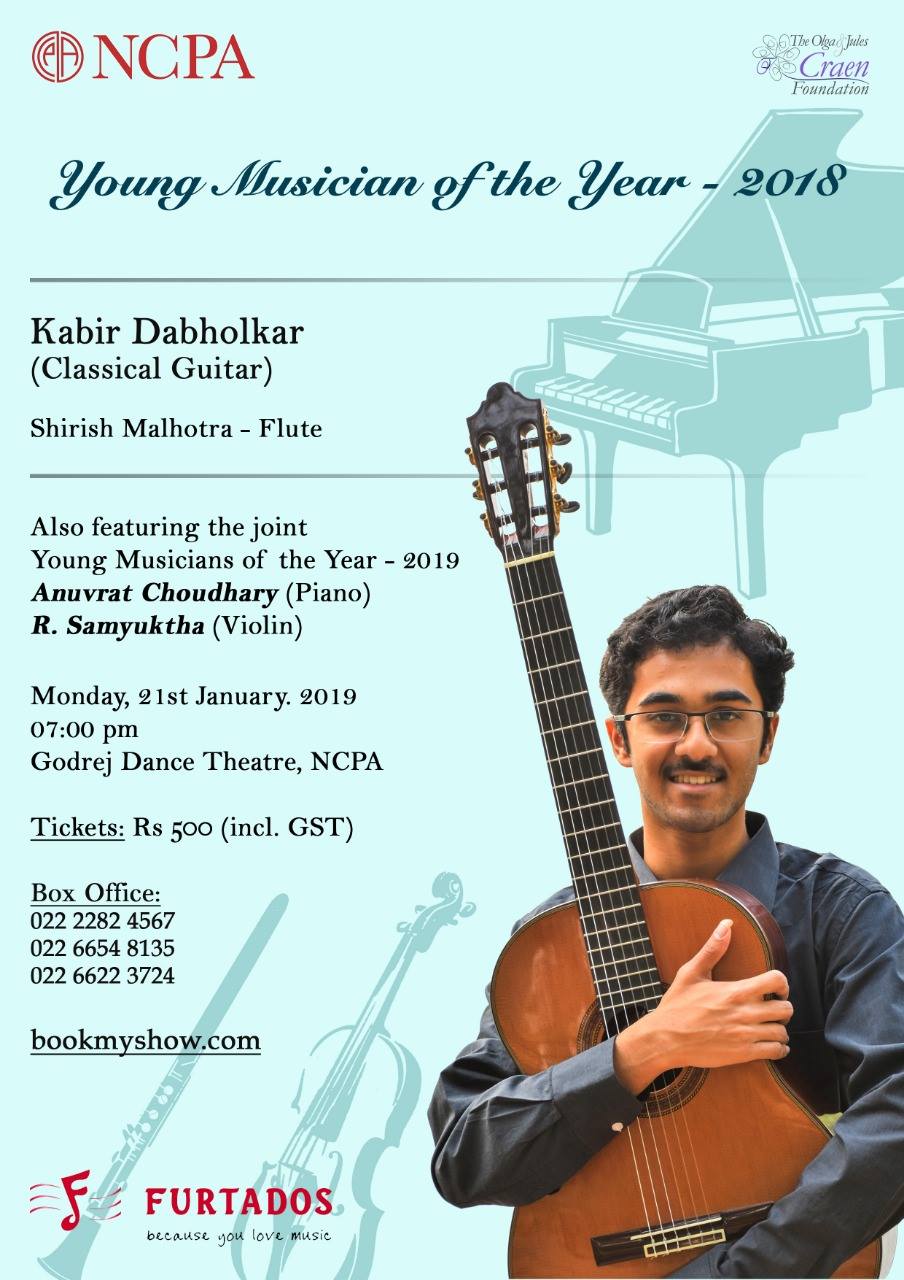Young Musicians of the Year: Anuvrat Choudhary and R. Samyuktha
The Olga and Jules Craen Foundation's (OJCF) prestigious Young Musician of the Year (YMOY) award has been won, for the year 2019, by two teenage musicians: pianist Anuvrat Choudhary and violinist R. Samyuktha. They will make their OJCF debut performance in Mumbai on January 21, sharing the stage with outgoing laureate, classical guitarist Kabir Dabholkar. In an interview with us, they talk about their music and their plans for the future.
Serenade Team: What made you decide to apply for the YMOY award?
R. Samyuktha (RS): I was looking for an opportunity to showcase my talent and to assess where I stand which is very important. YMOY award does not just stop with winning a competition but grooming a person to the next level. This competition has given me a platform for the very same reason and has improved my playing too.
Anuvrat Choudhary (AC): I have been following the news about the OJCF and its activities, mainly through this magazine. For a young musician it was really exciting to know about the many opportunities and support that the Foundation provides to its awardees. It was a cherished hope that I would also be able to benefit from these, and a really worthwhile goal to work towards.
Serenade Team: What does the award mean to you?
RS: It is a very prestigious award and will be etched in my memory forever. YMOY has given me a huge opportunity to exhibit myself to the Western classical musical world and is going to provide me with a huge learning experience through masterclasses being arranged and thus horizons getting expanded.
AC: It is a recognition of effort, and it will provide a great opportunity to perform and to learn. Being a performing musician can be a lonely business because of the gruelling hours of practice you put in. Inevitably there are times when you question whether you are going the way you want in terms of musical growth and achievement. So an award of this nature is a great encouragement because it has validated your journey till date.

Serenade Team: Do share some of the milestones of that journey.
AC: Acquiring a piano was a very significant step, which is something I owe to my first teacher’s persuading my parents to get for me. I do not have a musical background, so it was a big decision for them to take, given that I was just 9 years old. There was no guarantee that I would not lose interest. But having that instrument made practice, first, a necessity, and then a positive pleasure. When I went away to boarding school (The Doon School), many things changed, primarily because of the level at which I was made to engage with music. My teacher, Priya Chaturvedi, addressed all aspects of my piano playing, from technique, to contextual knowledge and an understanding of the nuances of style and idiom. Her input was enormous, as was the time she dedicated to working with me, so what happened was that a childish hobby became a serious obsession! When I went for student exchange to St Edward’s School in Oxford, known for its serious music programme, after my class 10, I had the chance to learn, perform, and best of all, interact with musicians my age, all equally engaged with music-making. It was wonderful being part of this community of like-minded people.
When I was appointed the school’s music captain, I had a chance to explore conducting and arranging orchestral scores. Taking it as a subject with Ms Chaturvedi as my teacher in the International Baccalaureate diploma programme, where I scored the highest grade, a 7, brought an academic depth to music, which was invaluable in expanding my horizons beyond my own playing. Conducting works like Rimsky-Korsakov’s Rhapsodie Espagnole, Gershwin’s Rhapsody in Blue, even a cover of Pink Floyd’s Brick in the Wall, enabled me to interpret orchestral works. Since my school also has a strong Hindustani music tradition, I was able to benefit from it by even conducting orchestral arrangements of ragas and qawalis.
As a solo performer, memorable events are playing at the NCPA Experimental Theatre under the auspices of the Stop Gaps Cultural Academy, at the Delhi and Calcutta Schools of Music, the India International Centre in Delhi and at the Trivandrum Centre for Performing Arts.
RS: I am trained in the Carnatic as well as the Western classical traditions. I started learning Western classical violin under Mr Edward Yen in Singapore and Carnatic music in Swara Raga Sudha, Chennai. After getting back from Singapore, I began learning from my current teacher Shri VS Narasimhan, with whom I gave my first Western classical performance as part of the Madras String Quartet. Playing Bach’s Double Concerto was a truly memorable experience.
On the Carnatic musical front, I subsequently had the opportunity to play along with my guru Shri VV Subrahmanyam in Chennai, Thiyagaraja Vidwat Samajam.
My first major solo western classical recital happened in June 2018 at the Goethe-Institut Chennai, along with pianist Mr Immanuel T. Along with Bach, Mozart and other Western composers, I performed a piece composed by Tamil poet Subramania Bharathiar and Saint Thiagarajar.
In October I again performed a solo recital in ARKAY Convention Centre in Chennai. This programme featured both Carnatic and Western classical music. Thus I consider myself fortunate to perform both system of music on the same platform.
Performing live with Oscar award winner Mr AR Rahman and Mr Ranjit Barrot, playing the background score for the Tamil movie Chekka Chivantha Vaanam, are things that I would cherish forever.
I participated in the workshop cum masterclass organized by the Bangalore School of Music that was conducted by Professor Nic Pendlebury, Head of Strings, from Trinity Laban Conservatory. This experience helped me transform my playing style and on his recommendation and advice, I am having online lessons with Lana Trotovsek. I consider this is as another great opportunity. These milestones have been made achievable by my parents, my teacher Shri VS Narasimhan, pianist Mr Immanuel T and all my friends and family who supported me throughout my dreams and are continuing to.

Serenade Team: You have both taken the diploma examination in performance, the Licentiate Trinity College London (LTCL) with Distinction. This is a remarkable achievement, given your age and the fact that this is an examination that is musically extremely rigorous. How important do you consider such exams for musical growth?
AC: I have taken both the ATCL and the LTCL, and both have been of immense benefit in my growth. The assessment criteria address every aspect of musicianship: technique, interpretation, communication, stylistic understanding and stagecraft. They ensure that a balanced programme is presented, so that one gets to become familiar with all styles like Baroque, classical, Romantic, modern. The assessment is meticulously recorded and one gets to know where one stands at an international level. For my LTCL, I really pushed myself, performing, on my teacher’s advice, Beethoven’s ‘Appassionata’, which is actually from the higher level repertoire, the FTCL. So yes, I would say that exams like the ones offered by Trinity are important for our growth. Another reason is that, here in India, we are apart from the mainstream of Western classical music study available in Europe, South East Asia, and the UK or USA. So Trinity helps one in maintaining and knowing about international standards of playing.
RS: Students consider musical examinations very seriously. These exams, sometimes might have piqued the interest of many students towards music. I see an opportunity of learning repertoires when someone enrolls for these exams. I have realized through time that quality practice alone definitely helps in grooming a person and one’s playing gets mature due to practice. These exams provide opportunities in these areas.
Serenade Team: What are your plans for the future, both immediate and longer-term?
RS: As a performer, my dream has always been to become an acclaimed soloist and perform in the Carnegie Hall. After completing my school, I would like to join a Conservatory to learn more on Western classical music and become a good performer.
AC: I am currently a 2nd year Philosophy major at Ashoka University, and working at my repertoire for the FTCL. So immediate plans are the completion of both. Long term, I plan to try to get into a Masters programme for Music, and have an ambitious list of institutes to apply to, from Juilliard and Trinity Laban, to some European Conservatories. So I need to work on programmes required by them for auditions. My focus is, above all, on learning, because there is so much to learn! While I continue to work with my teacher, Ms Priya Chaturvedi, I look forward to the learning opportunities and exposure that OJCF will provide through classes and performances here in India and abroad.
Serenade Team: Every performer has a dream repertoire of works for their instrument. Given that you are at the very early stages of your performing life, what are the 5 pieces that you would most like to eventually attain as being in your repertoire?
AC: Among the many, five would be, Schubert’s Wanderer Fantasie, Bach’s Goldberg Variations, Beethoven’s Sonata Opus 110, Lizst’s Petrarch Sonnet 104, and Bohuslav Martinu’s Sonata.
RS: Heinrich Ernst’s violin transcription of Der Erlkönig by Schubert, 24 caprices and the Concerto no 1 by Paganini, Sonatas and Partitas by Bach, and Tchaikovsky’s Concerto no 2.






